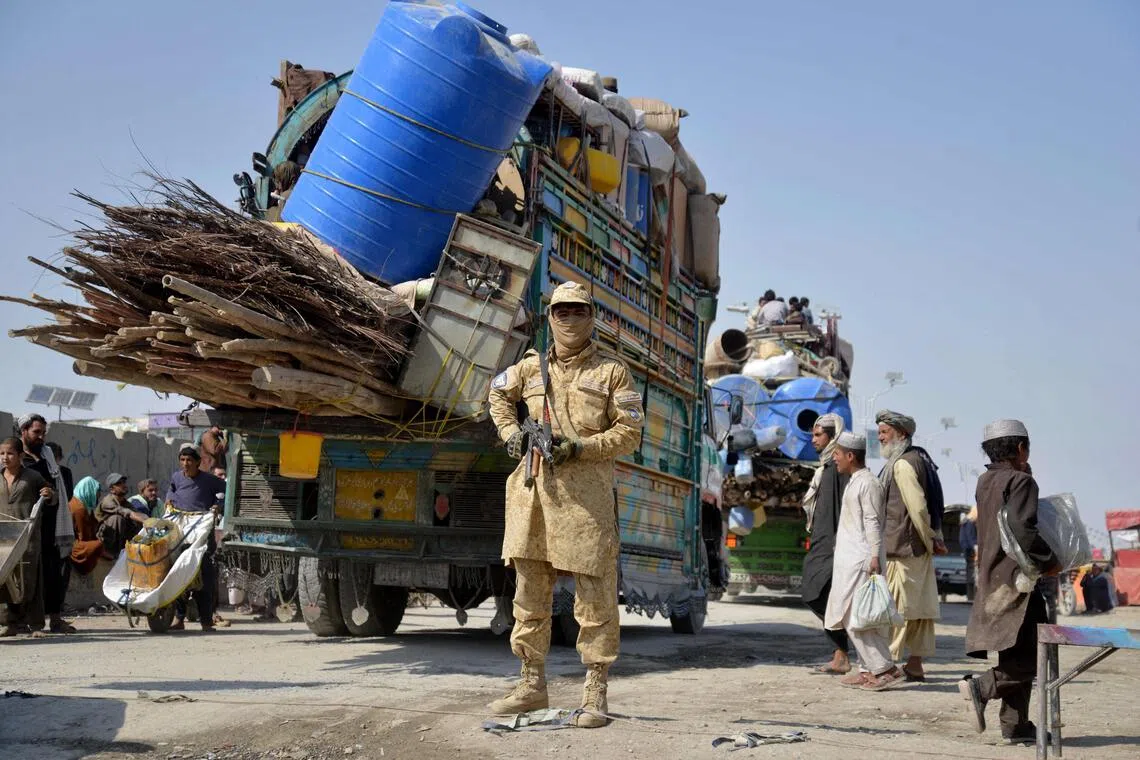Afghanistan and Pakistan exchange fire as peace talks restart in Turkey
Sign up now: Get insights on Asia's fast-moving developments

Taliban security personnel standing guard as Afghan refugees deported from Pakistan arrived in the Spin Boldak district of Afghanistan's Kandahar province on Oct 27.
PHOTO: AFP
Follow topic:
- Afghan and Pakistani troops exchanged fire near Spin Boldak amid peace talks in Istanbul, each blaming the other for instigating the clash.
- A ceasefire was signed in Doha on Oct 19, but a second round of negotiations ended without a long-term deal over militant groups conflict.
- Pakistan seeks Afghanistan's help to control militants attacking its forces, while Kabul denies harbouring the Pakistani Taliban group.
AI generated
ISLAMABAD/KABUL - Afghan and Pakistani troops briefly exchanged fire along their shared border on Nov 6, both nations said, on the same day talks to find a lasting peace restarted in Istanbul.
Each nation blamed the other for starting the exchange of gunfire near Spin Boldak, an Afghan border town towards the south of their 2,600km frontier.
There were no reports of casualties, and spokespeople for both sides said they remained committed to a ceasefire and continued dialogue
Militaries from the South Asian neighbours previously clashed in October,
Both sides signed a ceasefire in Doha
“We hope that wisdom prevails and peace is restored in the region,” Pakistani Defence Minister Khawaja Asif told reporters on Nov 5.
He said Islamabad was pursuing a “one-point agenda” of convincing Afghanistan to rein in militants attacking Pakistani forces across their shared border, allegedly with the Taliban’s knowledge.
Two government sources said the head of Pakistan’s military intelligence wing, Mr Asim Malik, was leading the Pakistani delegation.
The Afghan delegation is led by intelligence chief Abdul Haq Wasiq, Taliban spokesman Zabihullah Mujahid told state broadcaster RTA.
Talks aimed at preventing a repeat of violence
Pakistan and the Taliban had for decades enjoyed warm ties, but relations have deteriorated sharply in recent years.
Islamabad accuses the Taliban of harbouring the Pakistani Taliban, a separate militant group that has clashed repeatedly with the Pakistani military. Kabul denies this, saying it has no control over the group.
The October clashes began after Pakistani air strikes earlier in the month on the Afghan capital Kabul, among other locations, targeting the head of the Pakistani Taliban.
The Afghan Taliban administration responded with attacks on Pakistani military posts along the length of the border, which remains closed to trade.
While the ceasefire between the two nations’ militaries had held until the Nov 6 exchanges, clashes have continued between the Pakistani military and the Pakistani Taliban throughout the period, with multiple deaths reported on both sides. REUTERS

